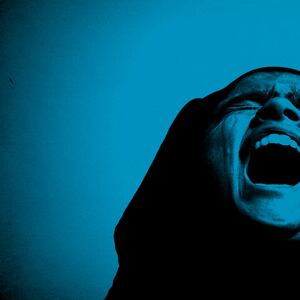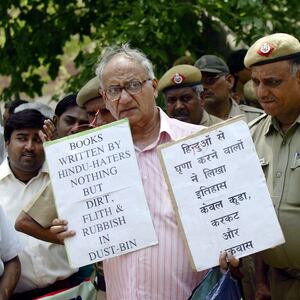With my stay in Kashmir now approaching its end, I wandered down to the town’s rugby pitch to see one of the beginners girls’ squads at practice. As Waheed Para had promised, it was a great story: a ray of light befitting the beauty of my surrounds.
The girls had only been playing for a week and seemed unwilling to get too violent with one another. “I saw a video online,” one girl told me excitedly. “They were smashing into each other like cars!” They admitted that passing the ball backwards had initially struck them as counter-intuitive. “Catching” made rugby somewhat difficult to master.
But then rugby, unlike cricket or soccer, doesn’t have an overly long history in Kashmir. When I took a photo of the girls' coach, Irfan Aziz Botta, he pointed to the goal posts behind him.
ADVERTISEMENT
“When these were first installed,” he told me, “people asked if they were some kind of artwork, or had some religious significance.”
The girls seemed very excited about the sport. Indeed, they seemed excited about sport in general. I would later speak with Irtiqa Ayoub, a 23-year-old who has become one of Kashmiri rugby’s leading lights. “In the town where I am from, it isn’t normal for a young woman to leave her home to learn how to play rugby,” she said. “I faced resistance from my parents, but as I began to have successes, winning some matches and getting some medals, they began to change their minds. Now they support me fully.”
But I also wondered whether the girls weren’t censoring themselves. With Botta there coaching their answers as well as the play they seemed not to be telling me everything.
After practice and my interviews were over, and a hundred thousand selfies had been taken, the girls retired to the nearby change rooms, from which they gradually emerged transformed. Gone were the Jammu & Kashmir Rugby Academy Jerseys, the shin pads and spiked boots. In their place, highly conservative salwar-kameezes had appeared, much like the one that Afshan Ashiq, the soccer star, had been wearing when she had her famous run-in with the police. Most of them were fully veiled, and indeed, later, when they started adding me on Instagram in their droves, I noted that none of them ever posted a selfie that didn’t start below the neck. A generation of girls, I would find myself thinking, playing a sport best-known for causing brain injuries, walking around with online profiles that caused one to think that none of them had heads at all.
As I struck out along MA Road, in the direction of Dal Lake, two of them sidled up to me nervously, falling in step, wanting to walk me home—and, it became immediately apparent, to ask me some questions of their own.
At first, these were mostly innocuous. What is Australia like? Do you have a photo of your wife? Do all Australian women have such beautiful eyes? Do any of them wear the veil?
But the questions quickly took on a more political bent. What, they wanted to know, did I think of Narendra Modi? What did I think of his visit to Srinagar?
Obviously, I knew what I thought, but wanted to turn the question back on them. What did they think of India’s prime minister?
“I hate him,” one of them said matter-of-factly. (I have withheld their names for obvious reasons.) She was a slip of a thing, 18-years-old but far younger looking, even though I could only see her eyes. There was something in them, and in her voice, that spoke to an anger much larger than her frame seemed capable of containing.
“He’s no good,” the other said. “But you don’t hate him.”
“No,” the first girl said. “I hate him. He hates Kashmiris. Why shouldn’t I hate him?”
I asked her what she thought of Ashiq.
“Oh, I love her,” she said. “She is very inspirational.” She nodded sagely. I liked her very much.
“Because she’s a good soccer player or because she’s a stone-pelter?” I asked.
“Both,” she said. “But mostly because she’s a stone-pelter. I would be a stone-pelter if I could. But my brothers won’t let me. They don’t think girls should be stone-pelters.” They probably didn’t think she should be playing rugby, either.
Her brothers were stone-pelters themselves, it turned out, and she thought their position very hypocritical.
“I would like to throw a stone at Modi,” she said as we approached the end of the road. “I would like to throw a stone in his face.”
We were nearing the Dalgate footbridge, where our paths were set to diverge. The other girl shook her head and said: “You shouldn’t listen to her. She’s showing off.”
I said I understood her anger. “That will help you with your rugby,” I said. The girls laughed.
Within 24 hours, I would see such anger unleashed. Stone-pelting wouldn’t be the half of it.
But first I had to meet Yasin Malik, the only member of the Joint Resistance Leadership it seemed possible for me to interview without alerting the Indian security services to my presence. Of course, I had arranged to meet him by email, which, as I had learned from my interview with Khurram Parvez, meant they had probably already been alerted to it.
Malik is the chairman of the Jammu & Kashmir Liberation Front, which once advocated for armed struggle against the Indian occupation, but now favors a political solution. He also doesn’t favor joining Pakistan, a view that helps to differentiate him from many of the pro-Pakistani militants in the region. He believes that Kashmir deserves outright independence, and has been agitating for it, in various ways, since the beginning of the 1980s.
I was planning to attend Friday prayers the next day, I told him. What did he make of the young people who took up, not arms, but rather stones against the military?
“What else are they meant to do?” he asked me. We were sitting in his office beneath a map of the region. It was quite a thing to behold. The cartographer behind it, driven by idealism, the commission, or both, had included Kashmir’s Indian, Pakistani and Chinese territories within the same, much hoped-for border. It was this that Malik hoped to make a reality, ideally by non-violent means.
“These children have grown up surrounded by conflict,” he said. “They have lived with the occupation, and the militancy, their whole lives. We cannot tell them no. They have taken the fight into their own hands. We should at least give them credit for that.”
My conversation with Malik was to remain fixed—and indeed would eventually flounder—on this contentious point. Although he has preached non-violence since 1994, following entreaties from the United States, the United Kingdom, and other European powers to do so, he could not bring himself to condemn, or even to describe as counterproductive, those among his countrymen who remain committed to armed struggle.
“My heart remains committed to the ideals of a non-violent democratic movement,” he told me. “But over the past four years, whatever little political space was available to us here, in which we could express our dissent, has been restricted even further. They’re not allowing us to march. They’re not allowing us to think.”
He asked me to think about that a moment.
“In the land of Gandhi, a nation state that claims Gandhi as its father—the man who gave these ideals to the whole world, to people like Martin Luther King and Nelson Mandela—in the very state that claims Gandhi as its father, we find no space for political dissent,” he said.
Malik was born in 1966 in a densely populated neighborhood of Srinagar. In the early 1980s, he helped to form the Tala Party, which, among various other acts of civil disobedience, attempted to disrupt a 1983 cricket match between India and the West Indies. By the end of the decade, Indian print media were describing him as “the self-styled commander-in-chief” and “most effective strategist” of the then-outlawed JKLF, and, no longer content with disrupting the cricket, he famously helped to kidnap the daughter of the Indian Home Minister Mufti Mohammad Sayeed in 1989.
He was arrested in 1990 and spent “many years” in solitary confinement. After his release on bail in 1994, he declared an indefinite ceasefire. The JKLF became very good at circulating petitions. (He claims that one of these, calling for political talks between India and Pakistan on the question of Kashmir, received more than five million signatures.)
“But at least 600 people, including many of my colleagues, were killed by the Indian state after that,” he told me. “The only ceasefire that can work in Kashmir is one that all the stakeholders can agree to. In the past, India has not been opposed to this idea. But things have changed in recent years. It is now more content to kill us than to have a conversation.” Modi’s Ramadan ceasefire, he said, was little more than political theatre.
“This is why we have seen a transition back towards violence,” he said. “These boys”—I had asked about Bilal Molvi, Saddam Hussain Paddar and Riyaz Naikoo—“believed in the non-violent movement once, too. But the space has been taken away from them. Harassment of their families has increased. They have seen their friends and families in body bags.”
“This is what radicalization is,” he said. “India is humiliating these people.”
What Malik refused to acknowledge, though, was the way the cycle of radicalization and militant funerals ultimately plays into the Indian government’s hands.
“These boys have nothing to answer to,” he said. “The Indians are the ones you should be asking.”
“The United States, the British government. They all asked me to give up arms, and I did,” he said. “They said they would convince India to create a space for discussion. Where is that space now? Even the British Empire gave space to Gandhi and the Indian National Congress.”
“Didn’t that have something to do with the fact that the British Raj was on its last legs?” I asked. “India sees itself as a rising power these days.”
“The fact of the matter is that the space existed for a non-violent movement,” he said. “The British knew that sentiment was against them, but they still allowed for that space to be created, and for the exploration of India’s democratic voice. But here in Kashmir, India is not allowing that space.”
“And where is the international community?” He was yelling at me now, on a roll. He was probably wondering who, exactly, he had invited into his office. His eyes were trained on me, even his lazy one, which seemed a lot less lazy now that it had a target. “These people do business with India while India continues to kill us. My dear brother, I will tell you this one thing. Today, the international community is supporting India without any compunction. What is the role of the United States in Kashmir? And not only in Kashmir, but in Iraq, Afghanistan, and Palestine, too? If there is no agreement on Kashmir today, it is because the international community’s national security and business interests demand that there cannot be. Where are the voiceless people in all this? Where are we? That is the question you must ask, my dear brother.”
I tried one final time. “I understand all this,” I said. He was interrupting me even as I started to speak and I was interrupting his interruption. “I agree with what you’re saying,” I said. “I’ve been to a lot of these places you’re talking about. But doesn’t the rise in radicalization make your work harder for you here? Doesn’t it allow the Indian government to claim that it’s right about Kashmir and to make it even harder for you to secure a political solution to the conflict?” More than 200 militants have been killed this year, the highest number in a decade, and yet the number of active fighters remains more or less stable.
Malik smiled and quietly said: “When I was their age, I was like they are now. You will not get me to condemn them.”
I said I wasn’t trying to. But then, by this point, it was also true that I didn’t know what I was trying to do. “I have to admit,” I eventually said, our half hour together finally coming to an end. “It almost sounds like you miss the armed struggle and have more faith in it today than you do in non-violence.”
He leaned back in his chair and considered the question. He held his hands in his lap as he spoke.
“I hope and believe in non-violence,” he said. “I will remain in the non-violent democratic movement until I die. I do believe this is how we will win.”
“But when you are fighting for a just cause, your conscience never questions your methods. This, you understand, my dear brother, is how countries are made. If King or Mandela had given up on their struggles—had people given up in other places—there wouldn’t be a single country in the world.”
Our time was up. Malik had meetings to attend. He extended his hand and looked me in the eye. “I am proud to say that I have played my part,” he said.
Tomorrow: Friday's Armies, and the conclusion of the series.









